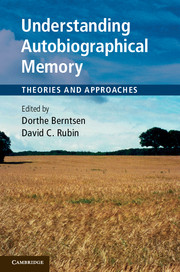Book contents
- Frontmatter
- Contents
- List of figures
- List of tables
- List of contributors
- Preface
- Acknowledgements
- 1 Introduction
- Part I Approaches to the study of autobiographical memory
- Part II Neural studies of autobiographical memory
- Part III Social and cultural aspects of autobiographical memory
- Part IV Development of autobiographical memory from infancy to old age
- Part V Evolution and basic processes of autobiographical memory
- Part VI Discussion
- Index
Part IV - Development of autobiographical memory from infancy to old age
Published online by Cambridge University Press: 05 November 2012
- Frontmatter
- Contents
- List of figures
- List of tables
- List of contributors
- Preface
- Acknowledgements
- 1 Introduction
- Part I Approaches to the study of autobiographical memory
- Part II Neural studies of autobiographical memory
- Part III Social and cultural aspects of autobiographical memory
- Part IV Development of autobiographical memory from infancy to old age
- Part V Evolution and basic processes of autobiographical memory
- Part VI Discussion
- Index
Summary
Development of autobiographical memory from infancy to old age
The three chapters in this part together address the development of autobiographical memory from infancy to old age. The chapters offer different perspectives on this topic and focus on different parts of the life span. The chapter by Bauer reviews and discusses research on memory in infancy and early childhood. Bauer identifies different rates of forgetting for very early childhood memories as compared to memories later in life. She discusses the implications of these findings for our understanding of infantile amnesia. The chapter by Fivush reviews and discusses how sociocultural factors affect autobiographical memory development. She proposes that although episodic representations are available from a very early age, the ability to construct and integrate such episodes into temporally and thematically coherent autobiographical stories of the personal past emerges gradually during the preschool years and continues to develop through adolescence under the influence of sociocultural factors. The chapter by Fitzgerald and Broadbridge examines the development of autobiographical memory from a life-span perspective and also discusses the implications of this perspective for research on autobiographical memory more broadly. Among other things, Fitzgerald and Broadbridge discuss possible explanations of the reminiscence bump (i.e., the increase of memories from young adulthood relative to the surrounding periods) from a life-span developmental perspective.
Information
- Type
- Chapter
- Information
- Understanding Autobiographical MemoryTheories and Approaches, pp. 203 - 204Publisher: Cambridge University PressPrint publication year: 2012
